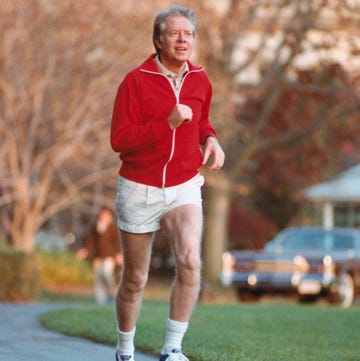You’ve probably heard not to worry about poor sleep the night before a race. The conventional wisdom is that pre-race tossing and turning won’t hurt your performance if you got adequate sleep earlier in the week. That reassuring advice logically leads to this question: What if, before you know you’re going to have a sleep deficit, you got extra sleep? Would, say, banking sleep in the week before a marathon improve your performance?
Yes, suggests research that will be published in Medicine & Science in Sports & Exercise.
French researchers had 12 men pull all-nighters (they stayed awake for 34-37 continuous hours) on two occasions. On one, the men followed their usual sleep patterns in the preceding six days; on the other, they went to bed two hours earlier than normal for the six days before staying up all night. At the beginning and end of both weeks, the men held an isometric knee extension (contracting the muscles but not moving the knee) for as long as possible.
Not surprisingly, under both set-ups the men performed worse on the test to exhaustion after being awake for 30+ hours. But when they had purposefully slept extra in the week before the all-nighter, their performance didn’t deteriorate nearly as much. On average, their time to exhaustion was eight minutes longer after banking sleep than after following their normal sleep patterns.
Although the study used an isometric exercise to test performance, lead researcher Pierrick Arnal, Ph.D., of the Armed Forces Biomedical Research Institute in France, told Runner’s World that his findings are applicable to runners. In part, that’s because of another significant difference after the men banked sleep—their rating of perceived effort during the test to exhaustion was lower on that occasion, despite performing an identical exercise.
“Even though our study was done in a lab with an isometric exercise with a duration of around 10 minutes, we believe that activities where motivation and perceived exertion are determinant could potentially benefit from sleep extension,” Arnal wrote in an email.
After all, research has found that sleep loss decreases motivation to perform even sedentary, daily-life activities. Arnal reasons that this effect—activities seeming harder, and a consequent lessened interest in seeing them through—could be greater with challenging physical tasks. This makes intuitive sense to anyone who has felt uncharacteristically apathetic on a hard run the morning after a poor night’s sleep.
“We believe that the longer the exercise, such as endurance activity, the more beneficial sleep extension is,” Arnal said.
Don’t worry that trying to bank sleep will mean lying awake until when you usually fall asleep. By going to bed two hours earlier than normal, Arnal’s subjects slept for an average of 75 additional minutes per night over the six-day study period. That was true even in people who weren’t sleep-deprived before the study.
“We believe that the beneficial effect would be accentuated in people who are chronically sleep-deprived for multiple reasons (work, young or sick kids, excessive usage of new technologies),” Arnal said.
If you want to try to bank sleep before your next race, Arnal suggests the following:
- Increase your sleep period by up to two hours per night in the week before the race. In Arnal’s study, the subjects did this by going to bed earlier rather than staying in bed later.
- Reduce light exposure in the evening, including light from screens such as phones and tablets. Avoid caffeine and other stimulants for four to six hours before bedtime.
- Maintain your usual training schedule, unless you usually run after 6 p.m. In that situation, try exercising earlier in the day.
- If possible, avoid extra stress during the week before the race. For example, postpone meetings and other responsibilities that might cause middle-of-the-night mulling.

Scott is a veteran running, fitness, and health journalist who has held senior editorial positions at Runner’s World and Running Times. Much of his writing translates sport science research and elite best practices into practical guidance for everyday athletes. He is the author or coauthor of several running books, including Chappell Roan: “I Love Running. But Not Anymore.&rdquo, Advanced Marathoning, and Meb for Mortals. Published: May 05, 2016 7:39 AM EDT Slate, The Atlantic, the Washington Post, and other members of the sedentary media. His lifetime running odometer is past 110,000 miles, but he’s as much in love as ever.













